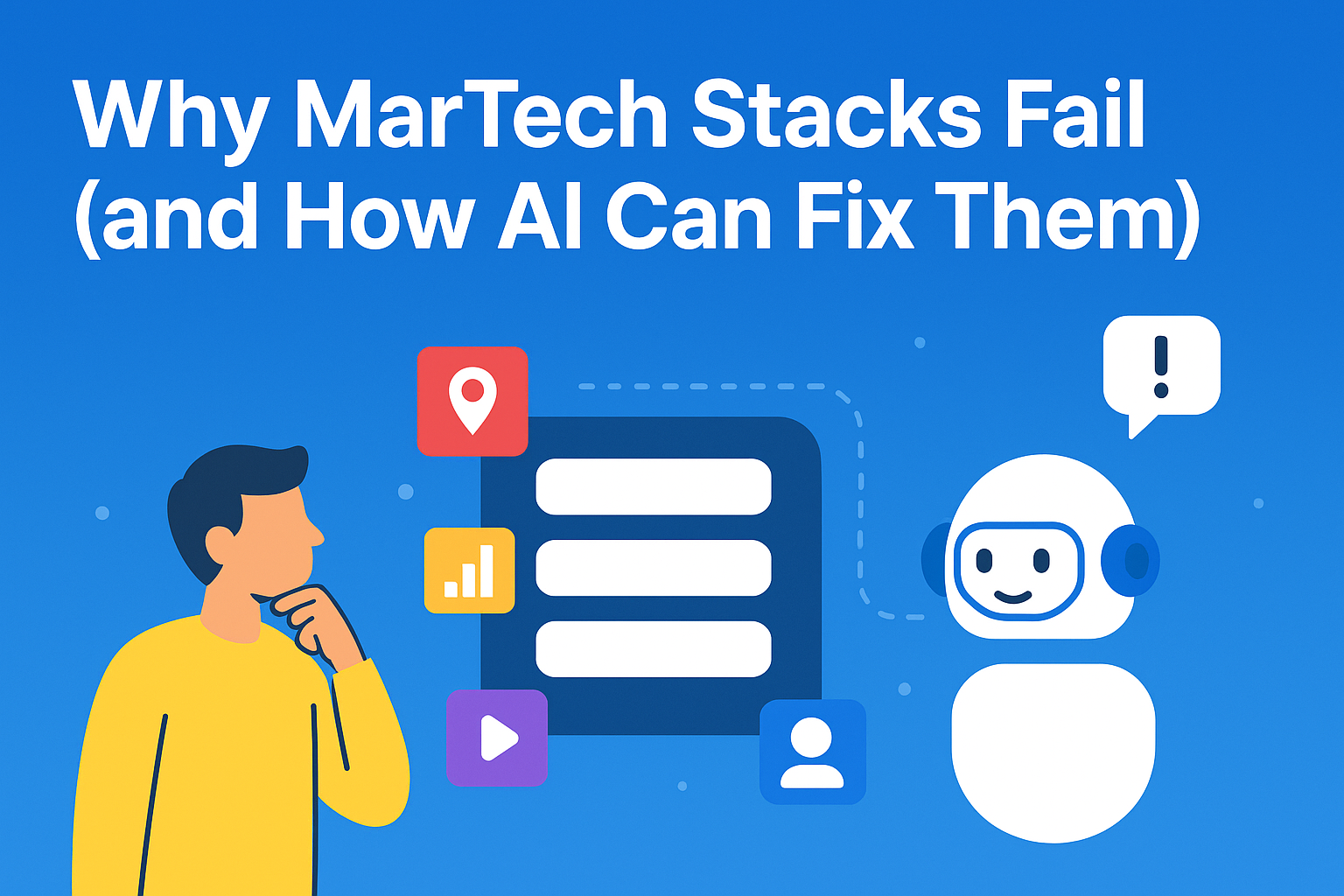
Why MarTech Stacks Fail (and How AI Can Fix Them)
Marketing technology investments continue climbing year after year, yet most organizations struggle to achieve meaningful returns from their expanding software portfolios. The average marketing department now manages over 120 different tools and platforms, creating complex ecosystems that often work against productivity rather than enhancing it.
Product Siddha, a Customer Lifecycle Agency based in India, has observed these challenges across numerous client implementations. Their MarTech consulting expertise reveals consistent patterns behind stack failures and demonstrates how artificial intelligence can address fundamental structural problems that plague modern marketing operations.
The MarTech Stack Reality Check
- 70% of MarTech implementations fail to meet objectives
- 45% of marketing tools go unused after purchase
- 60% of data remains siloed across platforms
- 30% average decrease in team productivity during implementation
The Root Causes of MarTech Stack Failures
Technology selection often occurs without comprehensive strategy development or consideration of existing infrastructure limitations. Organizations purchase individual solutions to address specific problems, creating fragmented environments where data cannot flow freely between systems. This approach leads to operational inefficiencies and prevents teams from achieving unified customer views.
Common Failure Pattern: A growing e-commerce company purchases separate tools for email marketing, customer service, analytics, and social media management. Each platform maintains its own customer database, creating conflicting information and requiring manual data entry across multiple systems. Marketing campaigns lack personalization because customer behavior data remains trapped in isolated platforms.
User adoption represents another critical failure point that MarTech consulting professionals encounter regularly. Complex interfaces and poorly designed workflows discourage team members from utilizing new tools effectively. When software requires extensive training or disrupts established processes, resistance develops quickly throughout organizations.
Integration challenges compound these problems by creating technical barriers between systems that should communicate seamlessly. Many organizations underestimate the complexity and cost of connecting different platforms, leading to incomplete implementations that fail to deliver promised benefits.
How Data Fragmentation Undermines Marketing Effectiveness
Fragmented data architecture prevents organizations from developing comprehensive customer understanding and delivering consistent experiences across touchpoints. When customer information exists in multiple systems without proper synchronization, teams make decisions based on incomplete or contradictory data sets.
Product Siddha’s MarTech consulting work reveals that data quality issues multiply exponentially as organizations add more tools to their stacks. Manual data entry increases error rates while duplicated information creates confusion about which source represents accurate customer details.
Product Siddha Case Study: A French rental agency struggled with disconnected systems for property management, tenant communications, and financial reporting. Customer inquiries required manual research across three different platforms, causing response delays and inconsistent information. Product Siddha implemented AI-powered automation using N8N and OpenAI to create unified data flows, reducing response times by 75% while improving accuracy and customer satisfaction.
The cost of maintaining fragmented systems extends beyond software licensing fees. Teams spend significant time managing data transfers, reconciling conflicting information, and troubleshooting integration problems. These operational inefficiencies reduce productivity and prevent focus on strategic marketing activities that drive business growth.
The Role of Artificial Intelligence in Stack Optimization
Artificial intelligence addresses fundamental MarTech stack problems by automating data integration, optimizing workflow efficiency, and providing intelligent decision-making capabilities. Modern AI systems can analyze patterns across multiple platforms to identify optimization opportunities and automate routine tasks that typically require manual intervention.
Machine learning algorithms excel at data unification by identifying duplicate records, standardizing formats, and maintaining consistency across multiple systems. These capabilities eliminate much of the manual work associated with keeping customer information synchronized between platforms.
AI-Powered Solutions:
- Intelligent Data Mapping: AI identifies relationships between different data sources and automatically creates connections
- Predictive Analytics: Machine learning models analyze customer behavior patterns to optimize campaign timing and content
- Workflow Automation: AI triggers appropriate actions based on customer interactions across multiple channels
- Performance Optimization: Continuous monitoring and adjustment of marketing processes based on real-time results
Building Resilient MarTech Architectures
Successful MarTech consulting focuses on creating architectures that can adapt to changing business needs while maintaining operational efficiency. This approach prioritizes flexible integration capabilities and standardized data formats that facilitate future technology additions without disrupting existing workflows.
Product Siddha emphasizes the importance of establishing clear data governance frameworks before implementing new marketing technologies. Organizations that define data standards, access controls, and quality processes early in their technology journey avoid many common pitfalls that lead to stack failures.
API-first technology selection ensures that new tools can integrate effectively with existing systems and future additions. Platforms with robust API capabilities reduce implementation complexity and provide long-term flexibility as business requirements evolve.
Product Siddha’s MarTech Implementation Methodology: Their approach combines AI automation services with strategic consulting to address both technical and organizational challenges. Using no-code platforms like Make.com, Zapier, and N8N, they create intelligent workflows that connect existing marketing tools while providing AI-powered optimization capabilities through OpenAI integration.
Overcoming Change Management Challenges
Technology implementation success depends heavily on user adoption and organizational change management. MarTech consulting professionals recognize that even the most sophisticated platforms fail without proper training, clear communication, and ongoing support for team members adapting to new processes.
Gradual implementation strategies reduce resistance by allowing teams to adjust to changes incrementally rather than attempting wholesale system replacements. This approach builds confidence and demonstrates value before expanding to more complex use cases.
Regular training and documentation updates ensure that team members can utilize new capabilities effectively. Organizations that invest in comprehensive user education achieve significantly higher adoption rates and better long-term results from their MarTech investments.
Measuring Success and Continuous Improvement
Effective MarTech consulting establishes clear success metrics before implementation begins. Organizations need quantifiable measures of efficiency improvements, user adoption rates, data quality enhancements, and business impact to justify technology investments and guide future decisions.
Regular performance reviews identify optimization opportunities and address emerging challenges before they become significant problems. This proactive approach ensures that MarTech stacks continue delivering value as business requirements and market conditions change.
Success Metrics for AI-Enhanced MarTech Stacks
- 85% reduction in data processing time
- 65% improvement in campaign performance
- 90% increase in data accuracy
- 50% decrease in manual administrative tasks
Future-Proofing MarTech Investments
Successful MarTech consulting considers long-term technology trends and business growth trajectories when designing system architectures. Organizations need flexible platforms that can accommodate new channels, data sources, and analytical requirements without requiring complete rebuilds.
Cloud-native solutions provide scalability advantages over traditional on-premise systems, while AI-powered platforms offer adaptive capabilities that improve performance over time through machine learning optimization.
Product Siddha’s experience demonstrates that organizations focusing on unified customer experience platforms rather than individual point solutions achieve better long-term results. This approach creates sustainable competitive advantages while reducing total cost of ownership.
Conclusion
MarTech stack failures stem from fundamental architectural problems, inadequate planning, and insufficient attention to user adoption challenges. Organizations that address these issues through comprehensive MarTech consulting and AI-powered automation achieve dramatically better results from their technology investments.
The combination of strategic planning, intelligent automation, and continuous optimization creates marketing technology ecosystems that adapt to changing business needs while delivering consistent performance improvements. Product Siddha’s approach demonstrates that success requires both technical expertise and deep understanding of organizational dynamics.
Companies ready to transform their marketing operations should focus on building unified, AI-enhanced platforms rather than continuing to add disconnected tools to already fragmented stacks. This strategic shift enables sustainable growth while reducing operational complexity and improving team productivity across all marketing functions.
Frequently Asked Questions: MarTech Stack Failures & AI Solutions
1: Why do most MarTech stacks fail?
MarTech stacks often fail due to fragmented systems, poor technology selection, data silos, integration challenges, and low user adoption. Without a strategic plan, organizations end up with disconnected tools that reduce productivity and limit actionable insights.
2: How does AI help fix MarTech stack problems?
AI automates data integration, identifies patterns across platforms, standardizes records, and optimizes workflows. Machine learning enables predictive analytics, intelligent data mapping, and real-time performance optimization, helping unify fragmented systems and improve marketing effectiveness.
3: What role does Product Siddha play in optimizing MarTech stacks?
Product Siddha provides end-to-end MarTech consulting and AI automation services. They assess existing stacks, implement AI-powered workflows using tools like N8N and OpenAI, integrate disparate platforms, and ensure adoption through training and strategic guidance.
4: How can organizations overcome change management challenges during MarTech implementation?
Gradual implementation, clear communication, comprehensive training, and ongoing support help reduce resistance. Organizations that focus on user adoption incrementally and provide documentation see higher engagement and long-term success with their MarTech investments.
5: What are the measurable benefits of AI-enhanced MarTech stacks?
Organizations experience faster data processing, improved campaign performance, higher data accuracy, reduced manual tasks, and better overall efficiency. AI-driven stacks enable unified customer experiences and continuous optimization, supporting long-term business growth.
